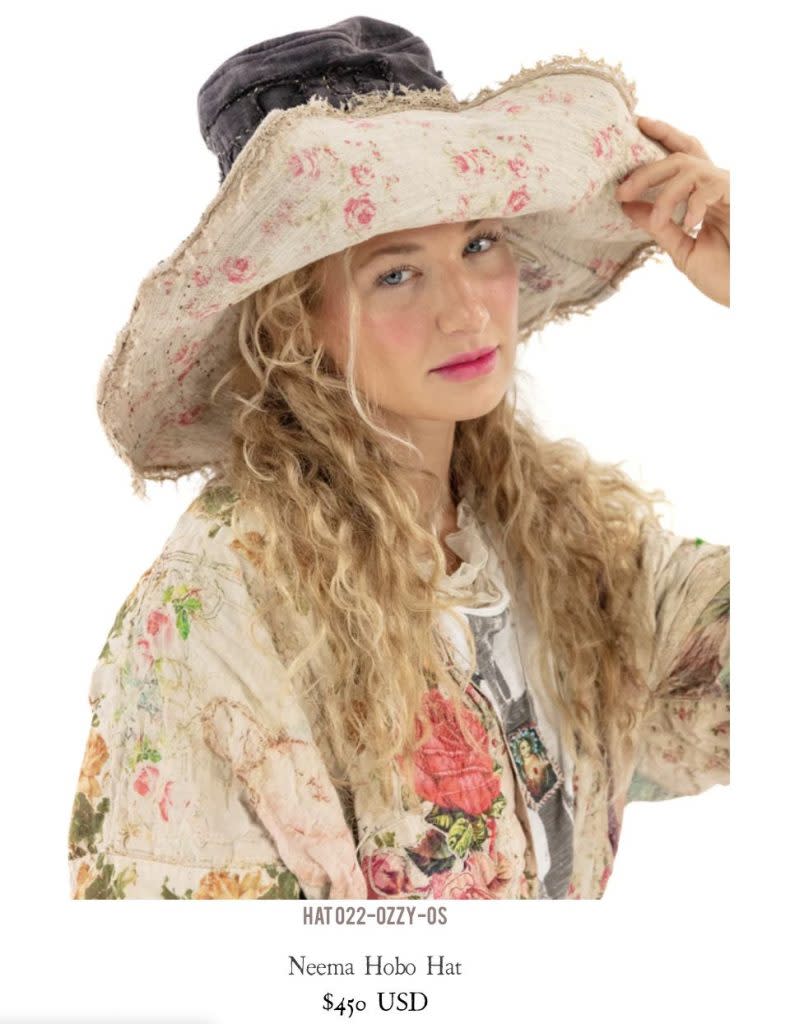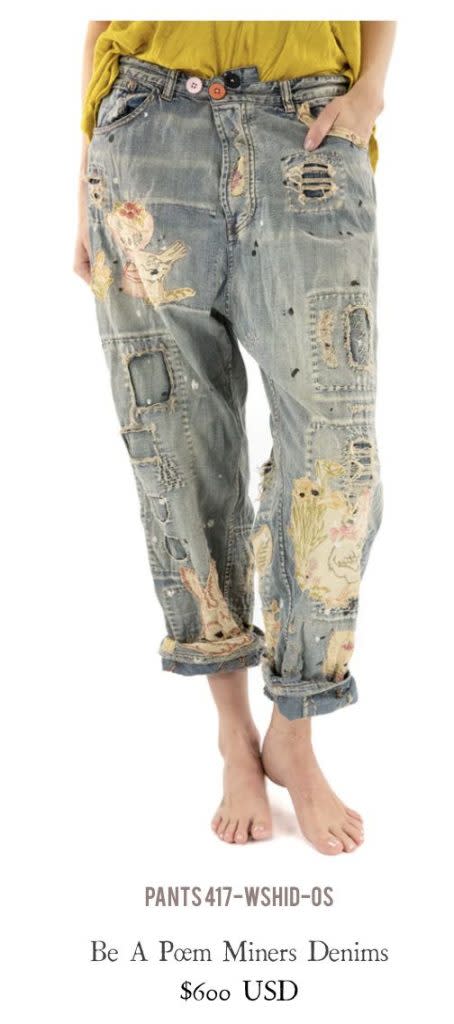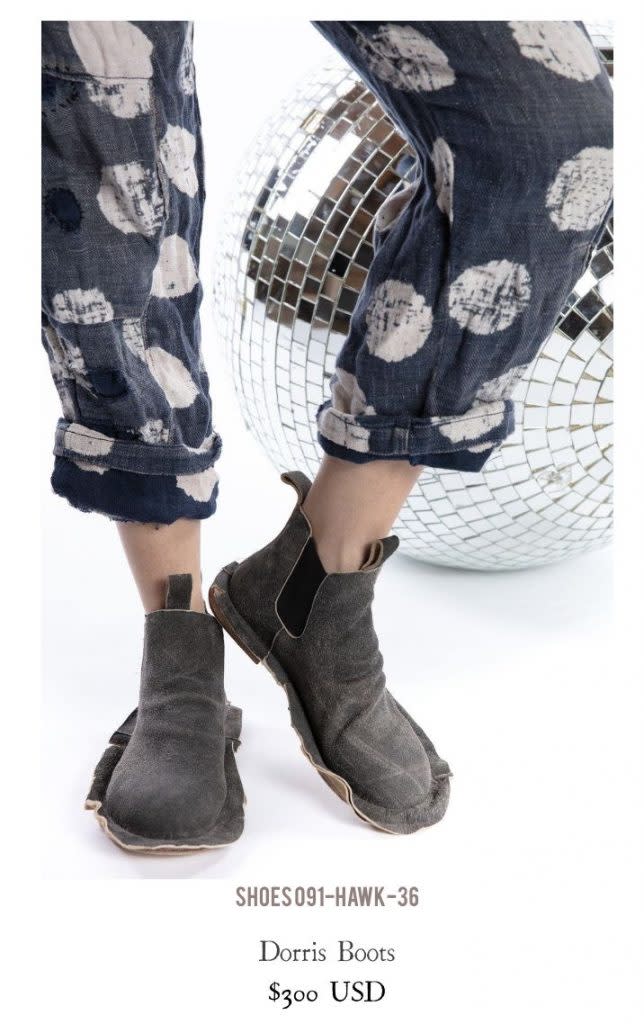We may earn commission from links on this page, but we only recommend products we believe in. Pricing and availability are subject to change.
TikToker calls out clothing brand Magnolia Pearl for their ‘poverty core’ aesthetic and high-end prices
A Texas-based clothing brand is being called out for its expensive “poverty core” fashion, thanks to one viral video featuring the brand’s “hobo chic” designs.
Magnolia Pearl, a boutique brand carried by Free People and 200 other retailers worldwide, describes itself as “more than just a clothing company.”
“Magnolia Pearl is about YOU, and how you tell your story,” its About Us page reads. “Our garments are just along for the ride — pieces of thread and light, sewn summations of surrender, and dreams, with a poem on the sleeve.
But it’s not the brand’s dreams and poems that are under fire: it’s their self-proclaimed “hobo” aesthetic that has TikTokers fired up, alongside its high-end prices.
TikToker @chealseajordyn likely never intended to spark a “poverty core” controversy when she filmed her mom’s OOTD, which featured head-to-toe Magnolia Pearl pieces.
The video quickly gained over 4.4 million views — and nearly 10,000 shocked comments.
@courtney_.young2: I thought they were “poor” until I went to the magnolia pearl website 🤯
@lizynco: I love when people cosplay great depression poverty slayyyyy
@redrum_lips: So rich that poor is the aesthetic
@my.pellow: really interesting how they look like hobos but their outfits cost a month of my pay…
The video was then dueted with TikToker @jaysonmimosa, who revealed the prices of each piece of “hobo chic” clothing.
Captioned with such hashtags as #RecessionCore, #GreatDepressionCore and #PovertyCosplay, @jaysonmimosa‘s video revealed that @chealseajordyn‘s featured outfit likely cost around $1,800.
The duet also brought to light Magnolia Pearl’s problematic design names, such as “hobo boots” and “hobo dress.”
In a follow-up video, @jaysonmimosa explained that she never intended to bring negative attention to @chealseajordyn or her mom — but rather to shed light on why drawing inspiration from poverty is so troubling.
Specifically, @jaysonmimosa calls out Magnolia Pearl’s problematic terms like “hobo chic,” which is featured across the brand’s website and Instagram captions.
One @magnoliapearl caption, riddled with poverty-coded language, reads: “Magnolia Pearl Malibu coming soon… Where Victorian, country farm, Surf, Oliver Twist, Charlie Chaplin and Hobo chic collide. A man walked into the store yesterday while we were working and said that I was a blonde chimney sweeper from the 1800’s 🤣🤣🤣Probably not a compliment but I thought it was a creative description.”
The Victorian Era — in which Oliver Twist was written, a novel about an orphan born into a workhouse and forced to live on the streets — is marked as a time of great disparity between the wealthy and the poor (an unfortunate connection to make to a high-end fashion label). It was a time of abject poverty, widespread famine and unsafe working conditions, according to Victorian Voices.
Chimney sweepers were just one of many harsh, unsafe and potentially fatal professions found in the Victorian Era. Those employed were often orphans or from impoverished backgrounds, and sometimes were sold into the profession by their parents, according to Historic UK.
Charlie Chaplin, also raised in poverty and hardship, turned his dark childhood into his famous character known as The Tramp, who used comedy to comment on the faults and excesses created by industrialization, according to the official Charlie Chaplin website.
“Surf hobo 🫶🏼🫶🏼🫶🏼🫶🏼,” another Instagram caption reads.
The term “hobo” is defined as a migratory laborer in the United States and became popularized after the establishment of railroads.
Many of these migrant workers were Civil War veterans looking for employment and forced to hop freight trains to travel to jobs. The number of “hobos” increased greatly after the Great Depression, when millions were suddenly thrust into poverty.
Magnolia Rose layered the “poverty chic” references with the caption, “Victorian Surf Hobo Malibu🫶🏼.”
The word appears across its social media accounts and websites, including product names, like the $450 “Neema Hobo Hat.”

Other products find more abstract ways to evoke poverty, such as its “miners denims” line.
Mining is dangerous and labor-intensive work — work that often abuses human rights, due to lack of appropriate equipment to protect workers from mine collapses and harmful pollutants and chemicals.
Miners are often forced to spend numerous hours working in extreme heat and darkness, often without breaks.

And while some products do not directly reference poverty, the designs certainly seem to be inspired by a very specific aesthetic, as with these $300 “Dorris Boots,” which evoke 1920s caricatures and cartoons of “hobos.”

TikTokers aren’t holding back on their criticisms of Magnolia Pearl, their aesthetic and their high-end prices.
@prnstr24: Poverty core 😍😍
@logancoverofdarkness: Larping [live action roleplaying] homelessness is wild
@holliowatercolors: It’s the “derelict” collection from Zoolander
@donutsnjams: I’m convinced the clothing company is mocking rich people. They have to be
@wolfpits: I have been poor so long I’m finally at peak fashion
However, Magnolia Pearl is certainly not the only brand to be accused of “cosplaying poverty.” Balenciaga has been frequently called out for their poverty-inspired fashions, such as their “distressed sneakers,” costing $1,850 — and their infamous “trash bag,” priced at $1,790.
Hopefully the fashion industry will one day learn that poverty is not a costume that can be worn, nor an aesthetic to aspire to.
In The Know by Yahoo is now available on Apple News — follow us here!
The post TikToker calls out clothing brand Magnolia Pearl for their ‘poverty core’ aesthetic and high-end prices appeared first on In The Know.
More from In The Know:
Viral Kardashian birthday cake is rumored to cost $7,000, and TikTok is perplexed
$1 Cartier purse from the 1920s fetches shocking price at auction, thanks to 'lucky girl syndrome'
Finally! The glass mushroom lamp that all the influencers have is more than 50% off right now

 Yahoo Finance
Yahoo Finance